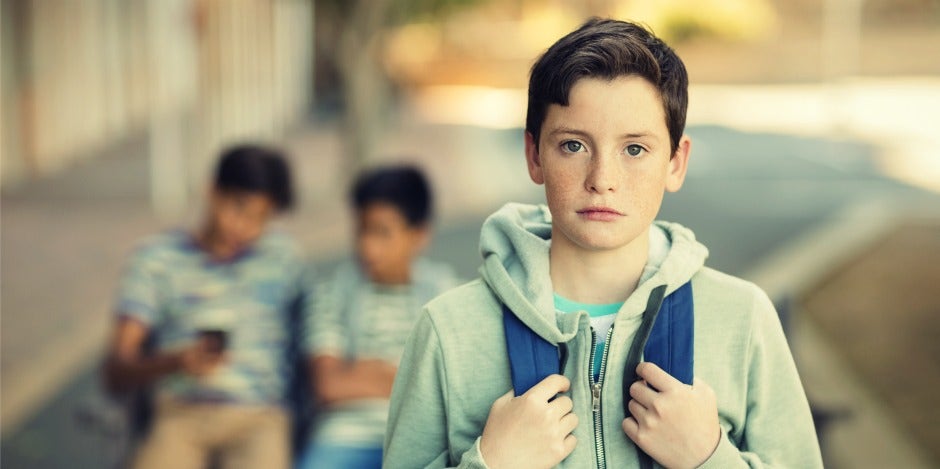How To Help When Kids Feel Left Out & Say They Have No Friends
End their feelings of isolation.
 Getty
Getty As a parent, one of the most difficult situations you can experience is when your child expresses loneliness or even tells you, "I don't have any friends." Learning how to deal with loneliness can be a struggle for anyone, but when it's your baby who says they're feeling lonely and left out, it's heartbreaking.
You watch as your child trails behind other children at a party. You watch him always on the edge of the group, lurking near children but not fully included with them. You know your child has always struggled with friends, but now his social isolation seems worse.
You come to realize that your child has no one to confide in, no one to share secrets with, and no one to laugh with. Your child comes home one day and tells you he has no one to sit with on the bus. And then your child says the words you have dreaded hearing, “ I have no friends.”
He's lonely — and you're crushed.
Every child feels left out from time to time, and every parent hears reports about teasing or a party your child isn't invited to.
As a parent, you know your child and you have a gut instinct from the first moment you look at them that tells you when your child is in need. And when you watch and see that he is feeling lonely, and you feel the terrible longing to help him and fix this problem just as you fixed scraped knees, torn stickers, and broken toys.
As a parent, you want to help, but dealing with loneliness isn't a lesson you wanted to ever have to teach them.
Here are 5 ways to help your child deal with loneliness and overcome isolation when they feel left out or say they have no friends:
1. Take a realistic view of their social skills
There are several social skills everyone needs to succeed in life, to manage school, friends, projects and eventually the workplace. For instance, all research shows that children need to learn to be able to adapt to any social situation, to scan the environment and then to adjust their behavior to meet the needs of the situation.
Consider assessing your child’s social skills, ask yourself, "Can my child make new friends? Could he join and collaborate with a group?" In order to start helping your child with his loneliness, you must first determine what social skills are holding your child back.
2. Open up communication
Try to find times to have a quiet conversation to understand what's going on for your child and what the social landscape at his school looks like. Give your child space to hear you care. No matter what he says, empathize and try to stay calm.
Many children are reluctant to share what is really going on, so one technique to help with this reluctance is to paraphrase what your child says and repeat it back to help clarify his concerns. For example, he might say, “There's just this one girl on the bus teasing me. Every day she says stuff to me, and I have no one to sit with so no one protects me.”
You can summarize and repeat back his statements which will you allow your child to clarify, share more information, and to tell his interpretation of the statement. By being curious and trying to understand his perspective, you invite him to be comfortable opening up to you. This will help you offer your child coaching to cope with the different social dilemmas.
3. Get Information
Information is power. Reach out to your child’s school and teachers to get more information about his daily life and to make them aware of the fact that your child is lonely and feels he has no friends. Siblings can be brought into the mission to help, comfort, and share valuable information. Try to stay calm and objective.
The goal is to find out why your child feels lonely and why he feels he has no friends.
4. Provide a place for your child to shine
Everyone needs a place where they feel good about their strengths — especially a child who is lonely and feels he has no friends. Discover his strengths, an area of interest, or a new place to meet potential friends with common interests. It will help your child feel good about himself and will give him something to look forward to as you deal with his loneliness.
5. Address safety and bullying
While you help your child develop new social skills and find new friends, it is important to navigate any bullying and to make sure they're safe and protected from physical harm. This often means informing the school, teachers, and coaches to remove your child from the bully’s orbit and to let the adults in your child’s life know he is experiencing distress. Often, schools are ready to help your child if they know he is feeling lonely and can offer your child support.
Caroline Maguire is a certified coach, the director of the Fundamentals of ADD Coaching for Families at the ADD Coach Academy, and author of Why Will No One Play With Me? which is coming in 2019. You can follow her parenting tips for solving common social dilemmas by signing up for her new mini-course available on her website.
